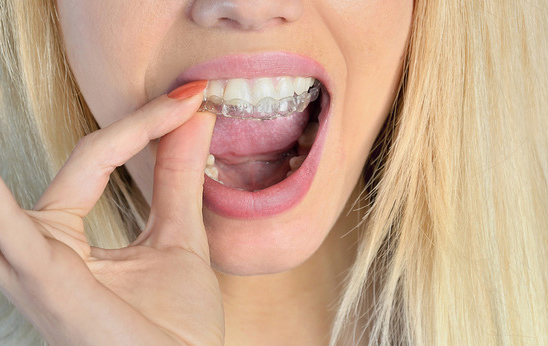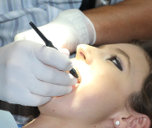
Are you considering undergoing the tooth whitening treatment? Do you have doubts? Are you afraid of side effects or of no effects at all? Find out whether you know everything about tooth whitening!
"Blue light", that is one of tooth whitening methods, is a laserThat is not true: a lamp used in this method emits metal-halide light, which helps to break hydrogen peroxide that is included in the whitening gel. Then, oxygen is released and the hydrogen peroxide particles oxidize the particles in the tooth enamel, which are responsible for discoloration. In effect, the whitening process takes place.
Teeth whitening is painfulIn fact, teeth and gums may be very sensitive to hydrogen peroxide. The majority of whitening methods increases tooth sensitivity for 24-48 hours - after this period of time teeth are remineralized by saliva. Whitening stripes may minimally increase teeth sensitivity for about a month, but this is a temporal side effect.
After the whitening treatment you will have a glamorous smile like a film starIt doesn't matter whether you choose an expensive in-office treatment, use a professional gel or products available in drugstores, you will never achieve the effect of celebrities on magazines covers because they usually have very expensive veneers.
Our teeth aren't naturally white – their shade is yellow, brown or grey. The whitening treatment only removes discoloration (caused by coffee, tea, etc.), but it will not change their natural shade. Remember that teeth stain with age!
Usually, you keep a white smile for about 18 months from the treatment. You can prolong the results by occasionally using the whitening stripes.
Everyone can undergo the teeth whitening treatmentUnfortunately, if you have dental crowns on you front teeth, you shouldn't whiten them - whitening treatment and products work only on natural parts of a tooth, artificial materials will never change their shade. What is more, you shouldn't undergo a whitening treatment when you are pregnant or nursing a baby.
Whitening treatment have been made since the late '80s. It usually lasts from 1 up to 14 days, and it has minimal side effects. The most common is tooth sensitivity (especially to cold stimuli), which diminishes within several hours from the treatment. Teeth whitening is one of the safest cosmetic dental treatments. However, you should not expect too much: only the discoloration will be removed - the teeth will not change their natural shade.
Article URL: https://www.dentist-pro.com/article,Teeth-whitening-myths-and-facts.html



Add comment